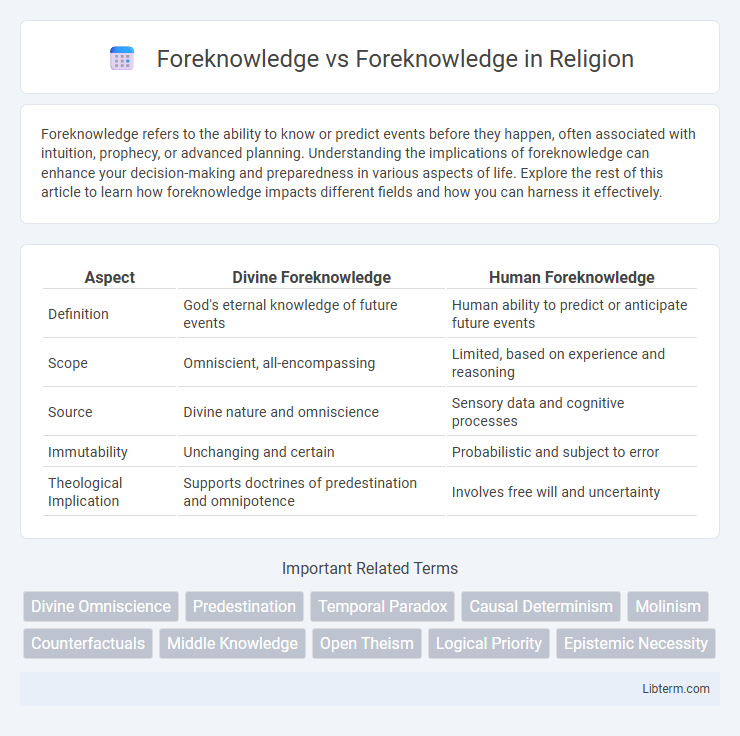Foreknowledge refers to the ability to know or predict events before they happen, often associated with intuition, prophecy, or advanced planning. Understanding the implications of foreknowledge can enhance your decision-making and preparedness in various aspects of life. Explore the rest of this article to learn how foreknowledge impacts different fields and how you can harness it effectively.
Table of Comparison
| Aspect | Divine Foreknowledge | Human Foreknowledge |
|---|---|---|
| Definition | God's eternal knowledge of future events | Human ability to predict or anticipate future events |
| Scope | Omniscient, all-encompassing | Limited, based on experience and reasoning |
| Source | Divine nature and omniscience | Sensory data and cognitive processes |
| Immutability | Unchanging and certain | Probabilistic and subject to error |
| Theological Implication | Supports doctrines of predestination and omnipotence | Involves free will and uncertainty |
Defining Foreknowledge: An Overview
Foreknowledge refers to the ability to know or predict events before they occur, often discussed in philosophical and theological contexts. It encompasses concepts like divine omniscience, where a deity possesses perfect knowledge of future events, and human anticipation based on evidence or intuition. Defining foreknowledge involves distinguishing between deterministic certainty and probabilistic prediction to understand its implications on free will and causality.
Historical Perspectives on Foreknowledge
Historical perspectives on foreknowledge examine how ancient philosophers like Aristotle and medieval theologians such as Aquinas grappled with the concept of divine omniscience and human free will. The Stoics viewed foreknowledge as a natural order governed by fate, contrasting with later Enlightenment thinkers who emphasized empirical evidence over metaphysical certainty. These evolving interpretations highlight the tension between predestination and human agency throughout intellectual history.
Philosophical Interpretations of Foreknowledge
Philosophical interpretations of foreknowledge analyze the tension between determinism and free will, exploring how knowing future events impacts human autonomy. The debate often centers on the compatibility of divine omniscience with the possibility of genuine choice, considering concepts like middle knowledge and open theism. Foreknowledge challenges the nature of time and causality, raising questions about whether future events are fixed or contingent.
Foreknowledge in Religious Contexts
Foreknowledge in religious contexts refers to the divine ability to know future events before they occur, often attributed to God or a supreme being. This concept plays a crucial role in theological discussions about predestination, free will, and divine omniscience, influencing interpretations within Christianity, Islam, and Judaism. Debates over foreknowledge impact doctrines regarding human responsibility and the nature of God's intervention in the world.
Foreknowledge and Free Will: The Debate
Foreknowledge refers to the ability to know future events before they happen, a concept deeply intertwined with debates about free will and determinism. Philosophers argue whether divine or absolute foreknowledge negates human free will by predetermining all actions, while others claim foreknowledge can coexist with free will if knowing the future doesn't cause it. Key thinkers like Augustine, Aquinas, and contemporary philosophers explore if foreknowledge implies inevitability or merely certain awareness without causal influence.
Types of Foreknowledge: Human vs Divine
Human foreknowledge involves individuals predicting or anticipating future events based on experience, observation, or analysis, often limited by cognitive and informational constraints. Divine foreknowledge refers to an omniscient being's complete and infallible knowledge of past, present, and future events, transcending temporal limitations and human understanding. The distinction centers on the scope and certainty of knowledge, with human foreknowledge being probabilistic and partial, while divine foreknowledge is absolute and comprehensive.
Foreknowledge in Science and Predictive Models
Foreknowledge in science refers to the predictive understanding derived from data analysis, experimental results, and established theories that enable forecasting future events or phenomena with a degree of reliability. Predictive models utilize statistical algorithms, machine learning techniques, and historical data to generate forecasts in fields such as climate science, epidemiology, and economics, enhancing decision-making processes. The accuracy of scientific foreknowledge depends on model quality, input data integrity, and the dynamic complexity of the systems being studied.
Foreknowledge vs Predestination: Key Differences
Foreknowledge refers to the ability to know future events before they occur, often associated with divine omniscience, whereas predestination involves the doctrine that all events, including human actions, are predetermined by a divine will or fate. Foreknowledge implies awareness without necessarily causing those events, while predestination asserts that future outcomes are fixed and unchangeable. The key difference lies in foreknowledge being passive observation of future events, contrasting with predestination's active determination of those events.
Implications of Foreknowledge in Ethics
Foreknowledge in ethics raises critical questions about moral responsibility and free will, particularly when individuals predict or know future actions. The implications suggest that if one possesses true foreknowledge, it challenges the concept of autonomous decision-making and accountability for choices. Ethical debates center on whether foreknowledge diminishes blame or praise and how it influences just judgments in moral contexts.
Modern Applications of Foreknowledge
Foreknowledge in modern applications leverages predictive analytics, machine learning, and AI to anticipate trends, behaviors, and potential outcomes in industries like finance, healthcare, and technology. Advanced algorithms analyze vast datasets to provide actionable insights, enabling businesses to optimize decision-making, risk management, and strategic planning. This proactive use of foreknowledge transforms traditional forecasts into dynamic models that adapt to real-time information and evolving market conditions.
Foreknowledge Infographic

 libterm.com
libterm.com